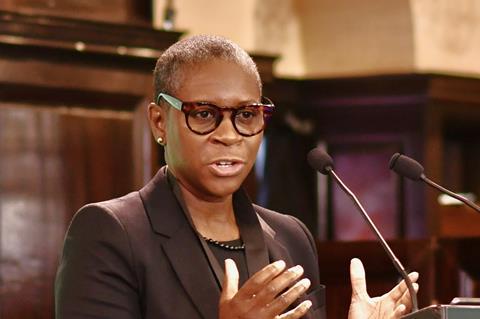Covid restrictions on work and travel deferred the full impact of Brexit on the ability of UK lawyers to advise and act in the EU. As the profession returns to normal, Marialuisa Taddia delivers a progress report on what practitioners have lost – and might still regain
The low down
Legal services were something of a surprise inclusion in the EU-UK Trade and Cooperation Agreement (TCA). This seemed to signal long-awaited recognition of the value of the £60bn sector’s economic contribution. And that from a Westminster government that instinctively kicks against all things lawyerly. The ability to offer ‘designated services’ in the EU was a ‘huge achievement’. But celebration was tempered by the exemptions each EU member state can put in place by opting for ‘non-conforming measures’. The reality is that each EU state remains sovereign in its regulation of professional services. For legal services there are reasons to view the TCA as global Britain’s first bad deal.
Brexit curtailed market access and practice rights for UK lawyers in Europe. But practitioners are only now beginning to confront those realities as Covid-19 restrictions are lifted.
The new rules for lawyers, laid down in the EU-UK Trade and Cooperation Agreement (TCA), have applied since 1 January 2021. The 1,246-page treaty contains a section dedicated to legal services that sets out ‘the general principle of permitting home-title practice of UK solicitors in the EU’, said Law Society president I. Stephanie Boyce last year on news that the European Parliament had approved the UK’s deal on 28 April. The TCA came into force three days later.

Yet while ‘reflecting the importance of the sector, worth £5bn to exports and £60bn gross value added to the UK economy annually’, the treaty ‘does not result in much increased market access for UK solicitors in the EU compared to other non-EU lawyers’, Boyce added. ‘Nor does it change the fact that, post-Brexit, UK solicitors and law firms are subject to 27 different regulatory regimes, one for each EU member state, each with different rules affecting their ability to provide services to clients,’ she said.
The EU has a separate regime for the free movement of lawyers that has its own sectorial directives (Lawyers’ Services Directive of 1997; the Lawyers’ Establishment Directive of 1998; and the Recognition of Professional Qualifications Directive of 2005). After leaving the single market and customs union the UK is no longer part of this arrangement. This has ‘considerably increased the complexity of practising in the EU’, says Marco Cillario, the Society’s international policy adviser for Europe. He adds that UK-qualified lawyers are in fact subject to 31 different regulatory regimes because the EU lawyers’ directives also apply to European Free Trade Association states Norway, Iceland, Liechtenstein and Switzerland.
'The treaty does not result in much increased market access for UK solicitors in the EU compared to other non-EU lawyers'
I. Stephanie Boyce, Law Society
Under the TCA there is a baseline commitment to allow UK lawyers to supply ‘designated legal services’ in the EU, which means advising on UK law and public international law, although crucially not EU law. They can also continue to provide arbitration, conciliation and mediation services under their ‘home jurisdiction professional title’, which means as advocates, barristers or solicitors. Cillario calls this ‘a huge achievement for the sector’.
But this is offset by ‘non-conforming measures’ that each state has listed in the annexes to the TCA. These are exemptions to the treaty rules. Guidance issued by the society says ‘these measures can place additional requirements or even effectively cancel the general principle of home title practice in certain jurisdictions’.
Essex Court Chambers’ Hugh Mercer QC, a Belgian avocat and chair of the Council of Bars and Law Societies of Europe (CCBE), explains: ‘As between EU states and third states, there can be a tiny amount of coordination of professional services such as exists under the TCA, but the fundamental principle is that each EU state remains sovereign in its regulation of professional services.’

Some EU countries are more open than others to UK-qualified lawyers. Jessica Clay, a partner in the legal services regulatory team at Kingsley Napley, points to the Netherlands, where UK lawyers can continue to practise under their home professional title in UK and public international law, and can also advise on EU law on the same basis as before. But they cannot advise on Dutch law. They can also represent clients in arbitration, conciliation and mediation, and can appear in court on matters of administrative law or for any claims under €25,000. For all other court matters, UK solicitors must be assisted by a Dutch lawyer.
A more restrictive regime operates in Germany. UK solicitors are only allowed to advise on UK and international law on a fly-in, fly-out basis, subject to conditions, and are prohibited from providing other legal services, Clay adds. Likewise, in France UK solicitors are able to register as Foreign Legal Consultants (FLC) and advise on UK law and international law only – on a temporary basis. They are not permitted to advise on French, EU or any other member state law, or act in court or before jurisdictional or disciplinary bodies of any kind. So it is ‘essential’ to check the regulatory requirements on a member state-by-member state basis, Clay advises.
Commenting on the ‘dizzying set of country-specific rules and restrictions’, Laura Devine, managing partner of Laura Devine Immigration in London, highlights another Benelux country. In Belgium, English solicitors continue to enjoy ‘extensive practising rights’ in that they can advise on English, public and EU law (though they are not permitted to represent clients in court). By contrast, English lawyers travelling to Austria to advise on English or public international law can only do so after receiving an express invitation from a client to travel to the country for advice on a matter, and only for a limited period.
Ireland closes the door
The Irish route to preserving English and Welsh solicitors’ practising rights in the EU is all but blocked. Only solicitors with a physical presence in the Republic of Ireland are currently being issued with practising certificates – and this has not changed since the measure was first announced in November 2020.
This is despite the ‘reciprocal qualifying agreement’ reached by the Law Society of Ireland and the Solicitors Regulation Authority in April last year to allow once again their respective solicitors to re-qualify in each other’s jurisdictions without having to sit any examination. This arrangement was temporarily suspended at the end of the transition period.
Solicitors qualified in England and Wales can apply for a certificate of admission to the Irish Roll of Solicitors but they must be based in the country to be issued a licence to practise.

Following an in-depth review of the regulatory framework for issuing PCs to lawyers based outside the jurisdiction, the LSI concluded that Irish-qualified solicitors ‘will not be issued with a practising certificate by the Society unless they can demonstrate in the course of their applications that they practise (or intend to practise) in Ireland from a physical establishment in Ireland’.
According to the LSI: ‘The review confirmed the Society’s view that, under the Solicitors Acts 1954 to 2015 and the regulations implementing those statutes, a practising certificate only entitles a solicitor to practise in Ireland from an establishment in Ireland. The review also confirmed that a practising certificate can only be issued to a solicitor on that basis.’
‘The decision was made after an influx of English solicitors who rushed to become dual-qualified – and protect their practising rights in the EU – in Ireland post-Brexit,’ says Laura Devine, managing partner of Laura Devine Immigration. By April last year, over 4,500 England and Wales-qualified solicitors had added their names to the Irish Roll since the Brexit referendum in June 2016.
A person familiar with the situation told the Gazette that this was ‘a very unique stance’ by a regulator and that the approach was inconsistent. ‘What if you are an Irish citizen qualified in Ireland and then you move to France, do you then lose the right to have a practising certificate there?’
Home title
Still, Cillario contends that the TCA has made ‘a huge difference’. Home title practice is permitted in the main EU markets. For example, the French arrangement, where British lawyers can practise under their home title by registering as FLCs with the National Council of French Bars, is only possible with countries with which France has a trade agreement (that is, the TCA) covering legal services.
Despite this, the current arrangement pales in comparison to the situation pre-Brexit. The EU regime allowed UK lawyers to practise EU law across the bloc, register with a member state’s bar or law society, and, after three years of ‘effective and regular practice’ of domestic law including EU law, re-qualify into that state’s legal profession (for example, as an avocat, avvocato or Rechtsanwalt) without sitting an exam. ‘That is no longer possible and the TCA doesn’t change that,’ confirms Cillario.
Nor have all EU members even fully implemented the TCA, which Cillario stresses only represents ‘a commitment by countries to confer certain rights on individuals’. For example, the Society’s attention was at the time of writing focused on Greece and Luxembourg. ‘They seem to have committed to allow UK lawyers to practise under their home title under the TCA; however, we need to clarify how these commitments are being implemented,’ he says.
Loss of privilege
'This demarcation of roles must be explicitly made in engagement letters and other communications, and a careful review of how legal assistance will be provided should have the safeguarding of client confidentiality in mind'
Jessica Clay, Kingsley Napley
What about EU legal professional privilege, which protects communications between UK-qualified lawyers and their clients in front of EU courts and other EU institutions? UK lawyers have lost that, too, along with their rights of audience before the EU courts. The decision of the Court of Justice of the European Union (CJEU) in the Akzo Nobel case in 2010 underpins the EU position on excluding EU LPP for third-country lawyers.
The loss of EU LPP is a problem in EU and European Economic Area (EEA) competition proceedings where, for example, in the context of a European Commission investigation, legal advice from a UK-based solicitor on cross-border EU operations may no longer be protected.
According to Clay, ‘there are some practical workarounds’, such as re-qualifying in an EEA jurisdiction and acting in the capacity of EEA-qualified lawyer when advising EU clients; or assisting rather than leading representations, with EU-admitted lawyers taking the lead role on EU-based matters. ‘This demarcation of roles must be explicitly made in engagement letters and other communications, and a careful review of how legal assistance will be provided should have the safeguarding of client confidentiality in mind,’ she says.
Mutual recognition
Also gone is the mutual recognition of professional qualifications (MRPQ) – another route for practitioners wishing to start or continue their EU law practice. According to the Law Society’s head of international Mickaël Laurans, the TCA ‘is not ambitious enough’ in addressing the issue.
The 2005 directive on MRPQ makes it easier for EU, as well as EEA countries and Switzerland, to recognise each other’s professional qualifications. For lawyers, it entails either sitting an aptitude test or passing an adaptation period.
'The bottom line is that British lawyers are now treated in exactly the same way as an Indian lawyer or US lawyer and they will have to get their qualifications recognised'
Catherine Barnard, University of Cambridge
‘It was a major achievement for the EU, and remember, it is not just the directive,’ notes Catherine Barnard, professor of European and employment law at the University of Cambridge and deputy director of the ‘UK in a Changing Europe’ thinktank. She points to the EU single market’s ‘regulated professions database’ that allows national bars to check each other lawyer’s qualifications in their own language. ‘Of course we are no longer part of any of that and it makes everything much more complicated,’ she says.
UK lawyers whose qualifications had been recognised by a host member state by the end of the transition period (or where the recognition procedure had started by then) were ‘protected’ by transitional arrangements, including the EU-UK Withdrawal Agreement. Barnard says: ‘Those who were not covered by the WA, which is most people going forward at the moment, count as third-country nationals and essentially it means that they have to apply to the bar of the host member state. The bottom line is that British lawyers are now treated in exactly the same way as an Indian lawyer or US lawyer and they will have to get their qualifications recognised.’
The TCA provides for the bars of Europe ‘to get together and agree to recognise UK qualifications’, adds Barnard. Article 158 says that ‘the professional bodies or authorities, which are relevant for the sector of activity concerned in their respective territories, may develop and provide joint recommendations on the recognition of professional qualifications to the Partnership Council’.
But Barnard explains that this is ‘a long process and indeed the provisions in the TCA reflect provisions in [the EU’s] Canadian free trade agreement’. Under the EU-Canada Comprehensive Economic and Trade Agreement or CETA, signed in 2016, the EU and Canada have reached only one mutual recognition agreement (MRA) – which is on the professional qualifications of architects.
An MRA for the legal profession would be harder to achieve than for other professions, not least because the laws and procedures governing practice are country-specific – for example, an Italian avvocato and an English solicitor do very different things.
Reflecting on these difficulties, Mercer says the TCA could be improved by way of an MRA with EU bars to relax some of the obstacles, but adds: ‘Some are currently opposed to this and so this will not happen soon as it needs unanimity... [it] might be possible in due course to have an MRA which has stricter rules for some countries than others.’
Immigration rules
Another area of divergence is the rules on immigration, now a complex patchwork covering 31 countries.
‘The end of freedom of movement is potentially a bigger challenge that law firms are considering and certainly we hear from members all the time,’ according to Cillario. He describes the mobility provisions in the TCA as ‘disappointing for the legal sector because they are difficult to apply to the way that lawyers work.
‘Our members are still getting their heads round the new system,’ he adds. That is because the pandemic kicked such issues into the long grass.
Ben Sheldrick, managing partner of Magrath Sheldrick, agrees and is equally perplexed by the TCA’s physical mobility rules which ‘go nowhere near replicating membership of the single market. These provisions are quite thin and generally are not more favourable to UK citizens than would be the case for other non-visa national applicants [such as US citizens]’.
There are five main categories for movement of people under the TCA: business visitors for establishment purposes (BVEPs); intra-corporate transferees (ICTs); contractual service suppliers (CSSs); independent professionals (IPs); and short-term business visitors (STBVs).
As Barnard observes: ‘You can only go if you fall into one of the five categories, and with respect to all of them there are quite significant limitations. You then need to go back to the TCA and look at the annexes because member states have all taken up “reservations” under each of the different headings.’ In all cases, she observes, ‘the amount of time you can spend in the host state is limited’.

‘Similar to rules on practising rights, the requirements of these routes may vary from one member state to the next, meaning English solicitors need to become familiar with the country-specific requirements for any given route,’ says Devine. ‘None offers a solution that is remotely comparable in terms of ease and simplicity to the position pre-Brexit.’
The short-term business visitor, for example, can only stay in the Schengen area for up to 90 days in any rolling 180-day period and is heavily restricted in what they can and cannot do; importantly, they cannot sell their services to the general public or receive remuneration from the member state they are visiting.
According to Fieldfisher’s Jonathan Peters: ‘The key issue for lawyers who need to work in the EU is whether they can provide paid legal advice to locally based clients when they are on short-term business visits in the country concerned. Most countries will have a strict prohibition on visitors working. But what is and what is not “work” is a grey area.
‘Some European countries will have different views on whether a lawyer who is billing time to a local client is actually working, and needs a work permit, or just visiting,’ he says. ‘A lot will depend on whether the activities of the lawyer come within a specific exemption or if the immigration authorities in a country concerned will simply turn a blind eye.’ But this uncertainty leaves lawyers ‘at risk of falling foul of the immigration rules of the country concerned’.
Transfer rights
Looking at the other options, intra-corporate transferees provide a potential solution to law firms with branches in the UK and EU which are hopeful of, or accustomed to, transferring English solicitors to the EU. But the eligibility requirements and the length of stay (maximum of three years for managers and specialists) are limiting, according to Devine.
Contractual service suppliers is another potentially useful category, allowing a law firm to post an employee to the EU for up to a year, but it is not available if the firm is established anywhere in the EU. It is also unclear whether the ‘independent professionals’ route, which allows self-employed professionals to provide their services in the EU, applies to firm partners.
Devine explains: ‘One category of English worker that may continue to work in the EU is a frontier worker. This is a person who lives in the UK but works temporarily in the EU. This might cover, for example, an English solicitor who is based in London but who travels to their firm’s Paris office several times a year. Unfortunately the eligibility criteria are strict. Individuals must have exercised their rights as a frontier worker before the end of the transition period and continue to do so thereafter. This means this route is not open to English solicitors who have not regularly worked in the EU before and since 31 December 2020.’
In addition, some member states have imposed additional requirements. In Belgium, individuals must spend a minimum of 45 days per year in the country to maintain their frontier worker status.
'The world was put on hold in terms of the movement of people due to the pandemic, and in a sense we are beginning to grapple with it [now]'
Ben Sheldrick, Magrath Sheldrick
There are ‘carve-outs’ in the rules for English lawyers who are travelling to the EU to represent clients before the CJEU, the European Patent Office and the International Criminal Court (for example). ‘However these exemptions are only likely to be of benefit to a relatively small number of English lawyers,’ says Devine.
Another route is the ‘EU Blue Card’ scheme, for highly qualified workers from outside the EU. This covers 25 of the 27 EU countries (it excludes Denmark and Ireland). But lawyers will be required to set up an employment contract with a local (EU-based) entity or company, notes Sheldrick, although the European Parliament’s adoption of a revised EU Blue Card directive in September 2021 ‘will make it easier for the EU companies to attract non European workers’, he says. The directive must be transposed into the national laws of member states by November 2023.
Another workaround could be ‘just doing it all online’, Sheldrick notes. ‘Why fly to Spain for two days when you can potentially have one or two hours on Teams?’
This would ease another burden being placed on lawyers and their firms. Mercer reiterates that lawyers already practising in other countries should benefit from the transitional regime under the WA, both with regard to right to practise and right to work without a visa or work permit.
‘But in practice,’ Mercer says, ‘though the right to practise is in the hands of bars and has been reasonably well applied, the right to work involves administrative processes applicable to all third-country workers. That involves queues in administrative offices, difficulties of getting appointments – you are in line along with asylum seekers from round the world – and ongoing visits to the public administration due to some adopting a renew-every-three-months approach.’

The good news is that none of this is set in stone. ‘It is possible to make changes to the TCA and indeed the TCA’s provisions on services do anticipate that,’ says Barnard. But she adds that ‘under this government it is very unlikely that you will see any changes at all, and if we do trigger article 16 of the Northern Ireland Protocol I think that will put any discussion of change on ice’. She explains that the EU will need a negotiating mandate for that, and at the time of writing that was unlikely.
There are ongoing discussions between the EU and the UK on the these and other issues within the Partnership Council and its specialised committees, established to oversee implementation, application and interpretation of the TCA.
This is one significant forum where the Society is ‘ensuring that the concerns of the profession are raised’, Laurans told a webinar on Brexit and the UK legal profession in January. Items on the agenda of the first meeting of the Trade Specialised Committee on Services, Investment and Digital Trade held in October were mobility-linked issues of implementation and transparency in relation to the entry and temporary stay of individuals for business purposes; and arrangements for the implementation of article 158 on the recognition of professional qualifications.
Speaking on 15 March, former Brexit negotiator and ex-Brexit minister Lord Frost said that the UK government ‘should take another look at mobility issues’. He conceded that the UK had been ‘too purist’ and ‘should try harder’ to ‘move to a more pragmatic position… in which some categories of specialist service providers can move more freely’.
Solving these problems matters. As Boyce puts it: ‘Legal services are hugely valuable to our national economy and to our global reputation, so for us this cannot be the end of the story. We will be working with national governments, bars and law societies across the EU to improve the framework for the international legal practice of non-EU lawyers, for their joint practice with local lawyers and for international legal cooperation.’
Marialuisa Taddia is a freelance journalist
































No comments yet